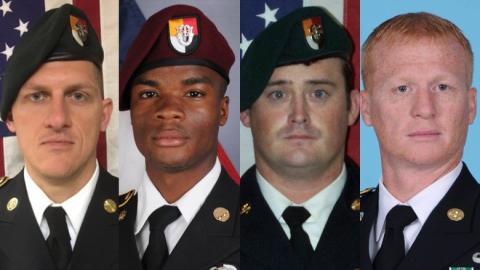http://www.youtube.com/watch?v=3gdHpoRV6S4&t=3m50s
The mainstream press continues to fuel controversy over a phone call President Donald Trump made to the widow of one of the four U.S. soldiers who were killed on October 4 when they were ambushed by I.S. soldiers in Niger.
But in the meantime, some are surprised that the U.S. has been carrying out military operations in the West African country of Niger in the first place, and wondering about the purpose of the U.S. presence in Niger.
Those who were surprised by the four Americans' deaths in Niger include Lindsey Graham (R-S.C.) and Chuck Schumer (D-N.Y.), two U.S. senators with a combined 60 years of foreign policy experience in the United States Congress.
On Sunday both senators said in separate interviews that they were unaware of the large U.S. presence in Niger and are supporting a congressional push for more information from the White House and Pentagon about U.S involvement in the region. They say the White House has so far been reluctant to divulge any details about the recent ambush in Niger or more information about military's presence there in the first place.
On NBC’s Meet the Press, Graham said:
"I didn’t know there was 1,000 troops in Niger. This is an endless war without boundaries and no limitation on time and geography. You’ve got to tell us more and he [McCain] is right to say that."
Remember that this is coming from Lindsey Graham, a staunch war hawk in the U.S. Senate with a personal philosophy of U.S. foreign policy that heavily favors military interventionism abroad.
During the Bush years, Graham was dubbed one of the "three amigos," along with John McCain and Joe Lieberman, who advocated for the heavy-handed use of the military after 9-11.
Graham has been a vocal supporter of the war in Iraq (including multiple "troop surges" to Iraq after the initial 2003 invasion), in Libya, in Yemen, and in Syria.
Yet even Lindsey Graham, with a Republican president sitting in the White House, now seems to be giving extra thought to mission creep and an aimless U.S. foreign policy putting Americans in harm's way for reasons that aren't even well defined, much less of any clear benefit to other Americans.
Reuters reports that Defense Secretary Jim Mattis told Graham and McCain -- who serves as chairman of the Senate Armed Services Committee -- that the Department of Defense is shifting focus in its counter-terrorism strategy to send more soldiers to Africa and assuming broader powers to deploy force against "suspected terrorists."
On the same NBC program Sunday, Chuck Schumer revealed that he too had been unaware that the DoD had amassed such a large presence of U.S. boots on the ground in Niger, suggesting Congress should re-consider the extent of the war powers it has delegated to the White House:
"We need to look at this carefully. This is a brave new world. There are no set battle plans. I would be for re-examining this. There is no easy answer but we need to look at it. The answer we have now is not adequate."
Schumer explained how Congress, which holds the power to declare war under the U.S. Constitution, currently authorizes very broad war-making powers for the president as part of the authorization for the use of military force that has been in place for a decade-and-a-half after the September 11 attacks.
The surprising U.S. presence in Niger, surprising even to two experienced U.S. senators, may be a wake up call that the congressional grant of military power to the White House is overly broad and overdue for a reassertion of congressional authority, responsibility, and restraint in U.S. foreign policy.
